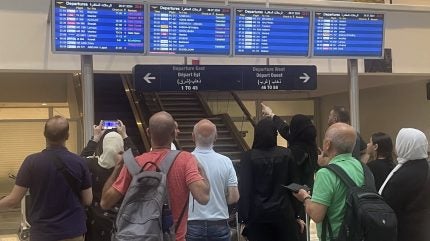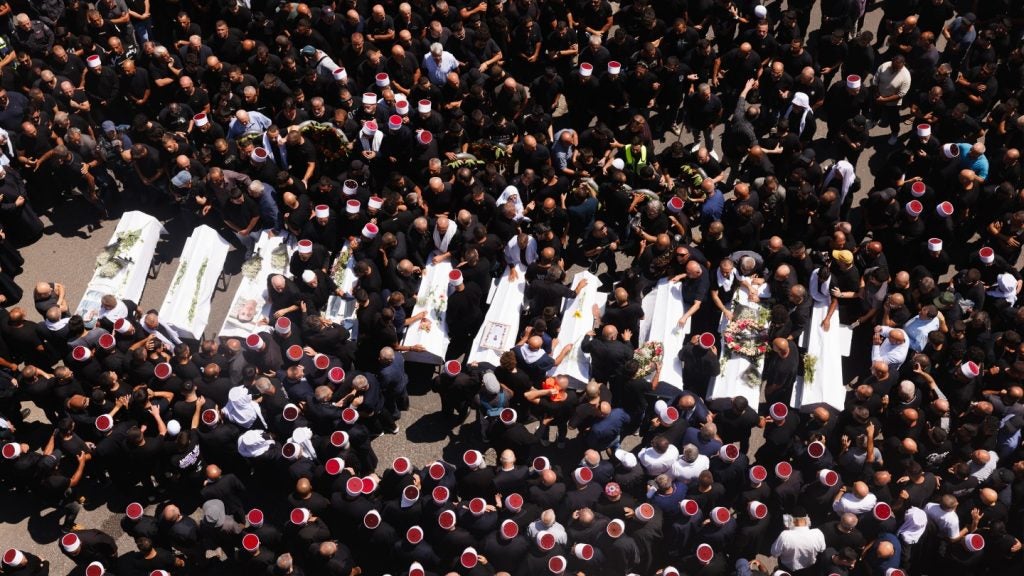
Multiple airlines have suspended flights in and out of Lebanon’s Beirut airport as insurance companies remove cover due to escalating conflict between Israel and the Hezbollah political militia.
“Due to the current developments in the Middle East, the airlines Lufthansa, Swiss and Eurowings of the Lufthansa Group have decided to suspend their flights from to/from Beirut up to and including 5 August,” a Lufthansa spokesperson told Airport Technology.

Discover B2B Marketing That Performs
Combine business intelligence and editorial excellence to reach engaged professionals across 36 leading media platforms.
On 28 July Israel’s Security Cabinet authorised the government to respond to a rocket strike that killed 12 children playing on a soccer pitch in the Israel-occupied Golan Heights.
While Hezbollah denies responsibility, the White House said the attack used “[Hezbollah’s] rocket, and launched from an area they control”. US National Security Council spokesperson Adrienne Watson called for the attack to be “universally condemned”.
The Lufthansa Group had previously said it would suspend Beirut flights up to and including 30 July.
This extension sees Lufthansa cancel a 29 July flight from Frankfurt to Beirut, and Lufthansa Group’s budget operator Eurowings cancel flights from Dusseldorf and Stockholm to Beirut.

US Tariffs are shifting - will you react or anticipate?
Don’t let policy changes catch you off guard. Stay proactive with real-time data and expert analysis.
By GlobalDataHow are other airlines responding to the potential Beirut airport threat?
Lebanese flag carrier Middle Eastern Airlines (MEA) has delayed 12 flights to and from Beirut on 28 and 29 July amid fears of an Israeli counterstrike damaging aircraft.
In a statement, MEA said the delays were “due to technical reasons related to the distribution of insurance risks for aircraft between Lebanon and other destinations”.
Flydubai, part of the Emirates Group, told Airport Technology that “flights to Beirut are operating to schedule” but added it is “monitoring the situation closely”. A Flydubai plane departed Beirut for Dubai on the morning of 29 July.
Flight path data from Flightradar24 shows limited traffic in and around Beirut-Rafic Hariri International Airport.
Qatar Airways has a flight scheduled to arrive from Doha, while Royal Jordanian has a flight departing Beirut for Amman, at the time of publication.
Etihad flew from Abu Dhabi to Beirut earlier today, while Turkish carrier AJet has a flight scheduled from Beirut to Ankara.
Iraqi Airways also has a flight scheduled to depart Beirut for Baghdad later.
Last month, The Telegraph reported that Beirut airport was storing advanced weaponry for Hezbollah – potentially providing justification for Israel to strike the civilian facility – prompting the Lebanese government to sue the UK newspaper.
Did Hezbollah target the Golan Heights – and why?
The Golan Heights, a rocky plateau 60km southwest of Damascus, has been a major flashpoint in the Middle East since Israel seized it from Syria at the end of the 1967 Six-Day War.
Israel unilaterally annexed the Golan Heights in 1981 – a move not recognised by any international power until the Trump administration in 2019.
Israel has settled the region and keeps it under military control, largely for the strategic vantage and natural topographic buffer it provides. Approximately 20,000 Syrians remain in the Golan Heights, most of them Druze Arabs.

The attack on 27 July targeted Majdal Shams, a Druze-populated town in the north-east of the Golan Heights. 12 children were killed, ten of them aged between ten and 16.
Spokesperson Mohamad Afif acknowledged Hezbollah strikes on the Golan Heights but continues to reject responsibility for the Majdal Shams deaths.
The Israel Defense Forces (IDF) said it had responded with strikes on seven Hezbollah targets “deep inside Lebanese territory”. Further airstrikes are expected. Iran-backed Hezbollah began strikes on Israel in solidarity with Gaza and the Palestinian territories, where more than 39,000 people have been killed since the Hamas attacks in Israel on 7 October.





